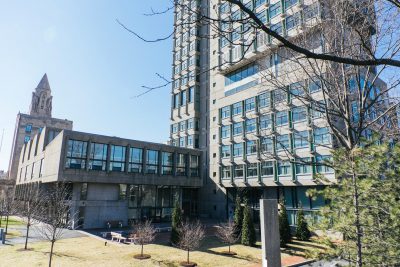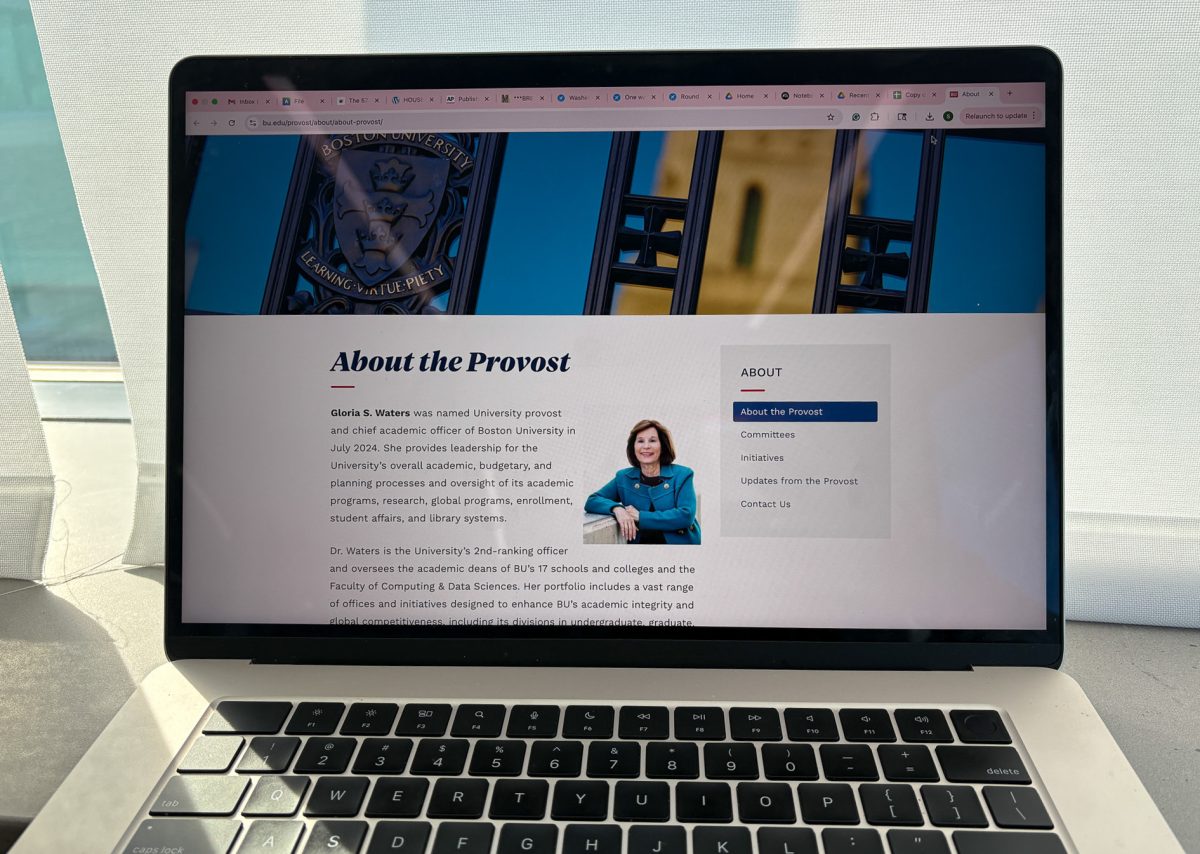
LGBTQ student organization OutLaw led a protest at the Boston University School of Law Monday against allowing the U.S. military, which under the Trump administration has proposed a ban on transgender people serving in the military, to be represented at a networking event.
OutLaw stated in a letter signed by 22 other student organizations to the LAW community that by allowing the military to recruit at the event, the school was in violation of its own non-discrimination policy. The policy states that the school “affords the use of its facilities and services … only to employers who do not discriminate on the basis of … gender identity.”
LAW Dean Angela Onwuachi-Willig wrote in a statement to the LAW community that the ban on transgender military service was in conflict with the school’s values, and that the presence of military recruiters was “inconsistent” with its non-discrimination policy.
However, Onwuachi-Willig wrote that she suspended application of the policy to military recruiters because of the Solomon Amendment, a 1996 federal law that allows the government to cut a university’s federal funding if it prohibits recruiting by the military on campus.
Barring military recruiters from campus would jeopardize BU’s federal funding, Onwuachi-Willig wrote, including money that goes to financial aid and research.
“Loss of this funding could potentially have a direct impact on many BU Law students, the majority of whom receive some form of federal financial aid, not to mention other students at the University,” she wrote. “Despite our unwavering commitment to diversity and inclusion, it would be irresponsible of us to put the entire University at risk of losing federal funding.”
Onwuachi-Willig called the decision to make an exception “difficult,” and wrote that she hoped that the transgender military ban would be overturned in the future.
“I recognize that the policy prohibiting transgender military service is deeply painful and may cause affected students to feel unsupported, alienated, and alone,” she wrote. “I want trans individuals at BU Law to know that they have my support and respect.”
Alex Weinstein, the incoming co-president of OutLaw, also noted that because of the Solomon Amendment, in some ways, LAW’s “hands are tied.”
Incoming Vice President of OutLaw Alex Phillips called the ban on transgender service members “insidious.”
“We’ve let it be known to the rest of the BU Law student body that people who go into the event do not have to visit the table staffed by military recruiters,” Phillips said, “and that we are encouraging students to vote with their feet and avoid that table if they can.”
Phillips added that if students did decide to visit military tables, they could ask the recruiters directly about the ban on transgender military service. If students were unfamiliar with the new policy, Phillips said, they could learn more at a table OutLaw had set up outside the event.
Emmylou Manwill, a second-year law student, said that she likes having networking events at LAW but agrees with OutLaw that the military’s ban on transgender service members is wrong.
“I came to just raise awareness about that and share my personal view that I don’t think it’s a good policy,” she said, “just showing all of the students at BU Law that there is a community that supports them and loves them and is here for them — whether they’re transgender or cisgender or any other part of their identity.”
Calvin Utter, a first-year law student, said that he disapproved of the military having representation at the networking event.
“I hope that the military recruiters will go back to their superior officers,” Utter said, “and tell them this policy is making it difficult for them to recruit the talent that they need in these jobs.”
John Dugger, a first-year LAW student, said that he hoped the protest will show the transgender community that they have support within the LAW community.
“As a student body we should be more willing to make our voices heard and stand up for issues we believe in, especially something as important as this issue,” Dugger said. “I think we shouldn’t be afraid to make sure that we’re heard and make sure that our classmates know that we support them.”


























































































































jess • Feb 12, 2019 at 9:26 am
Glad to see OutLaw was protesting the presence of the military at the event. Trans inclusion in public life is important and has been galvanizing for a lot of people, but the military never has been and never will be a liberatory force. We cannot legislate and imprison our way out of hate crimes and into inclusion. Given Dean Spade’s talk last year I was hoping that message had sunk in a bit more with more students – but it appears those opinions either aren’t found or aren’t represented here.
Yikes • Feb 12, 2019 at 9:20 am
It is canon that trans liberation will come from further the army’s mission of imperialism. As law students, or really university students, we should be capable of discussing how discrimination in institutions affects a concept of worthiness, even if we don’t want to be “worthy” without propping up such apparatuses.